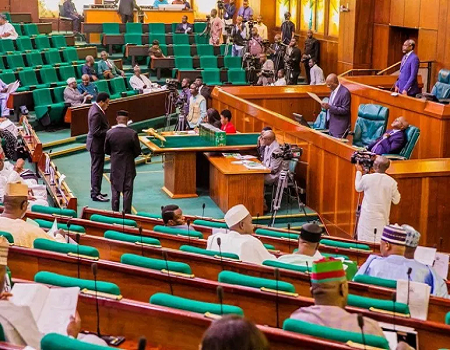The Attorney-General of the Federation and Minister of Justice, Mr. Abubakar Malami, SAN, has told a Federal High Court in Abuja that former Vice President, Atiku Abubakar, is not constitutionally eligible to vie for Presidency. The AGF told the court that Atiku is not a Nigerian by birth. He said the former Vice President whose home town, Jada, was formerly a part of Northern Cameroon, acquired Nigerian citizenship following a plebiscite that held in 1961. Malami argued that, having not been born a Nigerian or by Nigerian parents, and having not met the provisions of Sections 25(1) &(2) and 131(a) of the constitution, Atiku, would be violating Section 118(1)(k) of the Electoral Act should he put himself forward as a presidential candidate. “The first Defendant (Atiku) is not a fit and proper person to be a candidate for election to the office of president of the Federal Republic of Nigeria. “The first Defendant was born on the 25th of November, 1946 at Jada, at the time in Northern Cameroon. By the plebiscite of 1961, the town of Jada was incorporated into Nigeria. “The first defendant is a Nigerian by virtue of the 1961 plebiscite, but not a Nigerian by birth. The first defendant’s parents died before the 1961 plebiscite”, Malami argued in support of a suit that was lodged against Atiku by a group under the eagis of the Incorporated Trustees of Egalitarian Mission for Africa. Aside Atiku, other Defendants in the suit marked FHC/ABJ/CS/177, are the Peoples Democratic Party, PDP, the Independent National Electoral Commission, INEC, and Malami. The Plaintiff had in its Originating Summons that is already slated to be heard on May 4, posed three questions for the court to determine. It asked the court to determine, “Whether by section 25 of the Constitution of the Federal Republic of Nigeria, 1999 (as amended), is the sole authority that spells out ways by which a person can become a Nigerian citizen by birth? “Whether by the provisions of section 131(a) of the Constitution of the Federal Republic of Nigeria, 1999 (as amended), only a Nigeria citizen by birth can contest for the office of the President of the Federal Republic of Nigeria? As well as, “Whether by the combined interpretation of section 25(1) & (2) and 131(a) of the Constitution of the Federal Republic of Nigeria, 1999 (as amended), and giving the circumstances surrounding the birth of the 1st Defendant (Atiku), he can be cleared by the 2nd and 3rd Defendants to contest for the office of the President of the Federal Republic of Nigeria? Upon determination of the questions, the Plaintiff is seeking a declaration that by the provisions of the Constitution, “only a Nigerian citizen by birth can contest for the office of the President of the Federal Republic of Nigeria. It is equally asking the court to declare that giving the circumstances surrounding Atiku’s birth, he cannot be cleared by either PDP or the INEC, to vie for Presidency. While throwing his weight behind the suit, Malami, in an affidavit that was filed by his team of lawyers led by Oladipo Okpeseyi, SAN, argued that Atiku, having contested election to the office of the Vice President before now, even though he knew that he is not a Nigeria citizen by birth, committed an offence under Section 118(1)(k) of the Electoral Act. He contended that the effect of the June1, 1961 plebiscite was to have the people of Northern Cameroon integrated into Nigeria as new citizens of the country, even after Nigeria’s independence. “This qualified all those born before the 1961 plebiscIte as citizens of Nigeria, but not Nigerian citizen by birth. Consequently, only citizens born after the 1961 plebiscite are citizens of Nigeria by birth”, Malami added. Citing provisions of the 1960, 1963, 1979 and 1999 Constitutions, the AGF, argued that “reasoning of the lawmakers in ensuring that the persons to be the President of Nigeria is a citizen of Nigeria by birth is because such a person is the number one citizen and the image of the Nigerian state.” He told the court that where it is revealed that a person was born outside Nigeria before Nigeria’s independence in 1960, in a location which was never part of Nigeria until June 1, 1961, as in Atiku’s case, such a person cannot claim citizenship of Nigeria by birth. “This is even more so where his parents do not belong to any tribe indigenous to Nigeria until their death. The facts of his (Atiku’s) birth on the Cameroonian territory to Cameroonian parents remain unchallenged. “At best, the first defendant can only acquire Nigerian citizenship by the 1961 plebiscite. The citizenship qualifications under Section 26 and 27 of the 1999 Constitution of the Federal Republic of Nigeria (1999), by implication, has limited the first defendant’s privileges or rights and cannot be equal or proportional to the privileges of other citizens who acquire their citizenship status by birth. “This would include the legal preclusion of the first defendant from contesting for the office of the President of Nigeria”. He further argued that the only situation where Atiku could have acquired Nigerian citizenship by birth under the 1999 Constitution, was if both or either of his parents and grand parents were Nigerian citizens by birth. He added that another way would have been if either his parents had become Nigerian citizen by virtue of Section 25(1) of the 1999 Constitution, which must be in compliance with Sections 26 and 27of the same constitution. “With no concrete proof of compliance, we submit that the first defendant cannot contest election to the office of the Nigerian President”, Malami added. Meanwhile, both Atiku and the PDP had since asked the court to dismiss the suit which they said was grossly lacking in merit. In a preliminary objection be jointly filed with the PDP, Atiku, maintained that he is “a bonafide citizen of the Federal Republic of Nigeria”. He told the court that aside serving as Vice President from 1999 to 2007,














